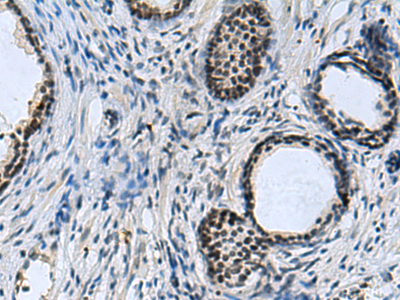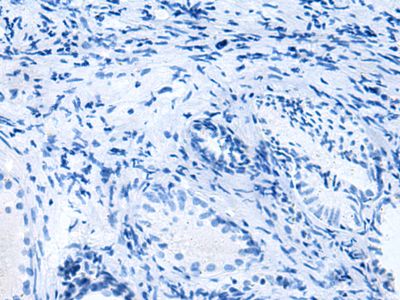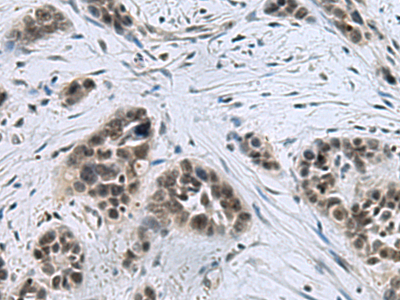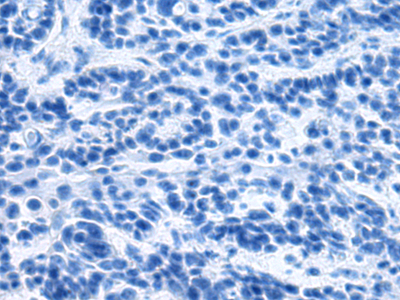| Cat.#: S222306 |
| Product Name: Anti-CCAR2 Rabbit Polyclonal Antibody |
| Synonyms: DBC1; DBC-1; NET35; p30DBC; p30 DBC; KIAA1967 |
| UNIPROT ID: Q8N163 (Gene Accession – NP_066997 ) |
| Background: Core component of the DBIRD comple,x a multiprotein complex that acts at the interface between core mRNP particles and RNA polymerase II (RNAPII) and integrates transcript elongation with the regulation of alternative splicing: the DBIRD complex affects local transcript elongation rates and alternative splicing of a large set of exons embedded in (A + T)-rich DNA regions. Inhibits SIRT1 deacetylase activity leading to increasing levels of p53/TP53 acetylation and p53-mediated apoptosis. Inhibits SUV39H1 methyltransferase activity. As part of a histone H3-specific methyltransferase complex may mediate ligand-dependent transcriptional activation by nuclear hormone receptors. Plays a critical role in maintaining genomic stability and cellular integrity following UV-induced genotoxic stress. Regulates the circadian expression of the core clock components NR1D1 and ARNTL/BMAL1. Enhances the transcriptional repressor activity of NR1D1 through stabilization of NR1D1 protein levels by preventing its ubiquitination and subsequent degradation (PubMed:18235501, PubMed:18235502, PubMed:19131338, PubMed:19218236, PubMed:22446626, PubMed:23352644, PubMed:23398316). Represses the ligand-dependent transcriptional activation function of ESR2 (PubMed:20074560). Acts as a regulator of PCK1 expression and gluconeogenesis by a mechanism that involves, at least in part, both NR1D1 and SIRT1 (PubMed:24415752). Negatively regulates the deacetylase activity of HDAC3 and can alter its subcellular localization (PubMed:21030595). Positively regulates the beta-catenin pathway (canonical Wnt signaling pathway) and is required for MCC-mediated repression of the beta-catenin pathway (PubMed:24824780). Represses ligand-dependent transcriptional activation function of NR1H2 and NR1H3 and inhibits the interaction of SIRT1 with NR1H3 (PubMed:25661920). Plays an important role in tumor suppression through p53/TP53 regulation; stabilizes p53/TP53 by affecting its interaction with ubiquitin ligase MDM2 (PubMed:25732823). Represses the transcriptional activator activity of BRCA1 (PubMed:20160719). Inhibits SIRT1 in a CHEK2 and PSEM3-dependent manner and inhibits the activity of CHEK2 in vitro (PubMed:25361978). |
| Immunogen: Synthetic peptide of human CCAR2 |
| Applications: ELISA, IHC |
| Recommended Dilutions: IHC: 50-100; ELISA: 5000-10000 |
| Host Species: Rabbit |
| Clonality: Rabbit Polyclonal |
| Isotype: Immunogen-specific rabbit IgG |
| Purification: Antigen affinity purification |
| Species Reactivity: Human, Mouse |
| Constituents: PBS (without Mg2+ and Ca2+), pH 7.4, 150 mM NaCl, 0.05% Sodium Azide and 40% glycerol |
| Research Areas: Epigenetics and Nuclear Signaling |
| Storage & Shipping: Store at -20°C. Avoid repeated freezing and thawing |

Immunohistochemistry analysis of paraffin embedded Human prostate cancer tissue using 222306(CCAR2 Antibody) at a dilution of 1/40(Nucleus). | 
In comparision with the IHC on the left, the same paraffin-embedded Human prostate cancer tissue is first treated with the synthetic peptide and then with 222306(Anti-CCAR2 Antibody) at dilution 1/40. | 
The image on the left is immunohistochemistry of paraffin-embedded Human thyroid cancer tissue using 222306(Anti-CCAR2 Antibody) at a dilution of 1/40. | 
In comparision with the IHC on the left, the same paraffin-embedded Human thyroid cancer tissue is first treated with synthetic peptide and then with D264363(Anti-CCAR2 Antibody) at dilution 1/40. |
|














